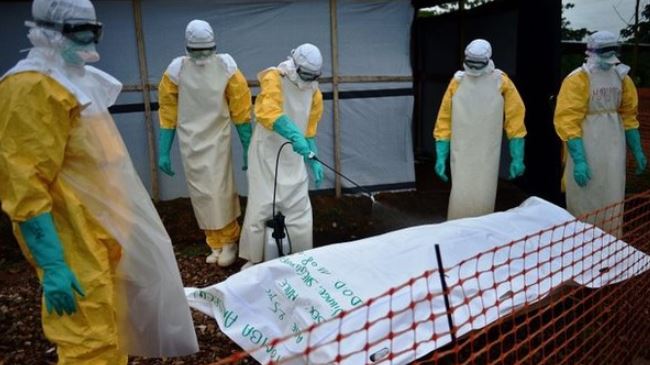 Doctors Without Borders' (MSF) medical workers disinfect the body bag of an Ebola victim at the MSF facility in Kailahun, Sierra Leone, on August 14, 2014.[/caption]
Doctors Without Borders' (MSF) medical workers disinfect the body bag of an Ebola victim at the MSF facility in Kailahun, Sierra Leone, on August 14, 2014.[/caption]More than 20,000 people may be infected with the Ebola virus before the outbreak in West Africa is controlled and curbing the epidemic will cost at least $490 million, according to a�World Health Organization�plan.
The number of people falling ill is accelerating, with more than 40 percent of the infections happening in the past 21 days, the Geneva-based United Nations agency said in an e-mailed statement today. In some areas, the number of cases may be two to four times higher than reported, the WHO said in a separate document, a so-called road map that lays out the plan to deal with the situation.
�The 2014 Ebola virus disease outbreak continues to evolve in alarming ways,� the WHO said in the road map released today. Liberia, Guinea and Sierra Leone are �struggling to control the escalating outbreak against a backdrop of severely compromised health systems, significant deficits in capacity and rampant fear.�
By mobilizing international resources, the WHO is aiming to stop Ebola transmission within six to nine months, the agency said in the document. The virus has infected more than 3,000 people, making it the biggest outbreak ever, and has killed more than 1,550. It�s on a pace to cause more deaths than all previous outbreaks combined.
 Photographer: Mohammed Elshamy/Anadolu Agency/Getty Images
Photographer: Mohammed Elshamy/Anadolu Agency/Getty ImagesVolunteers transport Ebola victims to a car ahead of their burial in Kenema, Sierra...�Read More
Increased Cost
The WHO�s cost estimate is up from $430 million in a draft of the road map reported by Bloomberg News this week.
Cases also have been reported in Nigeria. The death toll there has risen to six after a doctor who died in the southern oil city of Port Harcourt tested positive posthumously, Health Minister Onyebuchi Chukwu said in e-mailed statement.
There�s no cure for Ebola and the outbreak, which began in Guinea in December, has jumpstarted the development of drugs against the virus.
U.S. scientists will begin enrolling patients as soon as next week in safety trials of GlaxoSmithKline Plc�s experimental vaccine, Michael Kurilla, director of the Office of Biodefense, Research Resources and Translational Research, said yesterday in a telephone interview.
The virus is spread through direct contact with bodily fluids from an infected person. It causes fever, diarrhea, muscle pain, vomiting and, as it progresses, can lead to bleeding from the eyes, ears and nose. In the past, the fatality rate has been as high as 90 percent. About 52 percent of those infected in the current outbreak have died.
Funeral Practices
Doctors treat patients by keeping them hydrated, replacing lost blood and using antibiotics to fight off opportunistic infections. The goal is for the body�s immune system to eventually beat the disease.
The WHO and aid groups have struggled to bring Ebola under control. Widespread fear of the illness and suspicion of aid workers is prompting families to hide people with the virus, and funeral practices such as the kissing of corpses have propagated Ebola�s spread. The main countries hit by Ebola are among Africa�s poorest, with rudimentary health systems, inadequate supplies and a shortage of doctors and nurses.
That shortage has been compounded by the toll Ebola has taken on health workers this year. More than 240 developed the disease in the four countries, and more than 120 have died, the WHO said on Aug. 25.
By Bloomberg
The Iran Project is not responsible for the content of quoted articles.











